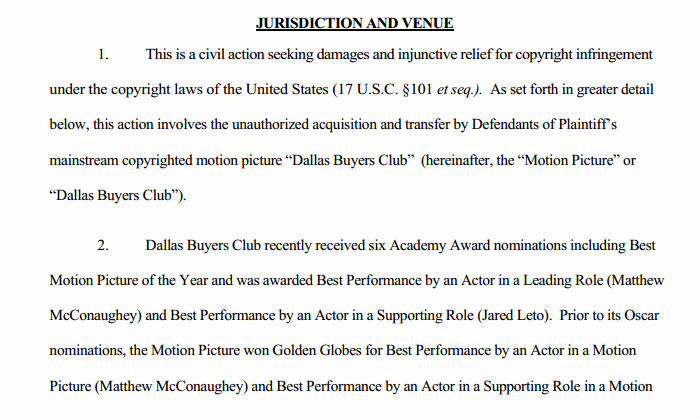TorrentFreak Email Update |
| Dallas Buyers Club Sues BitTorrent Pirates Citing Oscar Wins Posted: 12 Mar 2014 04:00 AM PDT
The company has pioneered mass-BitTorrent lawsuits in the United States and is estimated to have made a lot of money doing so. Most recently it has filed lawsuits against alleged downloaders of Dallas Buyers Club. The first lawsuits were filed on behalf of Voltage, and this week they were followed by two mass-BitTorrent suits “Dallas Buyers Club, LLC” filed with an Illinois federal court. The two lawsuits target 107 individuals who allegedly shared a pirated copy of the film from their home connections late January. While most of the language in the complaint is standard, the filmmakers appear to have waited for the Academy Awards, as the recent Oscar wins are prominently featured. “Dallas Buyers Club recently received six Academy Award nominations including Best Motion Picture of the Year and was awarded Best Performance by an Actor in a Leading Role (Matthew McConaughey) and Best Performance by an Actor in a Supporting Role (Jared Leto),” one of the complaints reads. In addition to the six Oscars, the makers also mention the Golden Globes and several other awards the Dallas buyers Club has won recently, stressing that the film “has significant value” TF reached out the Dallas Buyers Club’s lawyers to ask if more lawsuits are queued up but we haven’t received a response thus far. As with all other mass-BitTorrent lawsuits the end game is not a full trial, but to reveal the identities of the alleged downloaders so they can be encouraged to settle. To accomplish this the movie studio asked the court to grant a subpoena so they can order associated ISPs to give up their customers' details. The cased filed in Illinois this week almost exclusively targets Comcast subscribers. For defendants it’s wise to contact an attorney. Alternatively, DTD points out that there is a standard template that can be used to respond to the accusation. The current defendants all downloaded the movie before it won the Oscars. However, it’s worth noting that the number of active downloaders of Dallas Buyers Club quadrupled the day after the Academy awards, resulting in roughly 100,000 extra downloads. Even today Dallas Buyers Club is still downloaded by tends of thousands of people, which means that the pool of potential targets for these lawsuits is far from exhausted. Source: TorrentFreak, for the latest info on copyright, file-sharing and VPN services. |
| Canadian Movie & Music Pirates to Be ‘Fined’ Without Court Orders Posted: 11 Mar 2014 09:23 AM PDT
Companies such as Voltage Pictures favor very big sticks indeed, suing tens of thousands of file-sharers for thousands of dollars each, both in the United States and Canada. US-based Rightscorp, on the other hand, favor a smaller stick, sending settlement demands to alleged file-sharers for relatively smaller amounts per infringement. Until recently they were confined to the United States, but all that is about to change. In a move to expand its business model north of the border, Rightscorp has retained Susan Abramovitch, a partner at Gowling Lafleur Henderson LLP, one of Canada’s largest lawfirms. Based in the company’s Toronto office, Abramovitch is described as a leading entertainment lawyer covering disputes in the music, film, television and videogaming industries, among others. Rightscorp says that Canada represents a new market for its business model and an important step in the company’s international expansion plans. Implying that settlements are now accepted practice in Canada, the company references the recent Voltage Pictures case involving Teksavvy, which saw the ISP ordered to hand over the details of 2,000 alleged file-sharers. However, while the Voltage case resulted in protracted legal argument and was ultimately subjected to court-ordered constraints, Rightscorp’s settlement demands are designed to circumvent controversial disclosure issues. Alleged infringers are reached via settlement notices attached to regular DMCA-style notices forwarded to them by their ISPs. In the US, Charter Communications passes on Rightscorp cash demands, but Comcast does not. Will Canadian ISPs comply? To get a broader idea of how this kind of business model might play out in Canada, TorrentFreak spoke with Canadian law professor Michael Geist.
“At the moment, there would be no legal obligation on the ISP to forward the notice to the subscriber, though that is likely to change in the coming months.” When that notice-and-notice system does take effect, Geist says that Canadian law may specify the form notice letters must take. “The law already identifies specific information to be included in the notice. There is no reference to settlement information or legal demands. If the Canadian government objects to [Rightscorp's] approach, it could use regulations to stop the inclusion of settlement demands in notice letters,” Geist explains. “Even if it doesn’t, there will be a question of whether the notices are in the proper form if they include information beyond that found in the statute.” Since local ISP Teksavvy is at the core of the Canadian Voltage Pictures case, TorrentFreak spoke with the company to gauge its reaction to the news that Rightscorp might soon come knocking. Stopping short of an official comment on the business model, the ISP essentially echoed Michael Geist’s sentiments. “TekSavvy would be within its rights to insist, and would insist, that any notice conform with Canadian law and not over reach the stated guidelines,” the ISP told TF.
“The notice-and-notice law permits the government to set a fee for sending a notice that an ISP can charge. At the moment, it does not look like the government will establish a fee, preferring to wait to see how the system develops. Were this [business model] to come to Canada, the government might face increased pressure from ISPs to allow them to charge for their participation in the process,” Geist concludes. TF approached Rightscorp lawyer Susan Abramovitch who did not immediately respond to our request for comment. The signs are, however, that she could be busy with this work during the months to come. Photo: Michael Theis Source: TorrentFreak, for the latest info on copyright, file-sharing and VPN services. |
| You are subscribed to email updates from TorrentFreak To stop receiving these emails, you may unsubscribe now. | Email delivery powered by Google |
| Google Inc., 20 West Kinzie, Chicago IL USA 60610 | |



 Despite
Despite 
